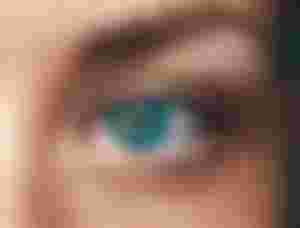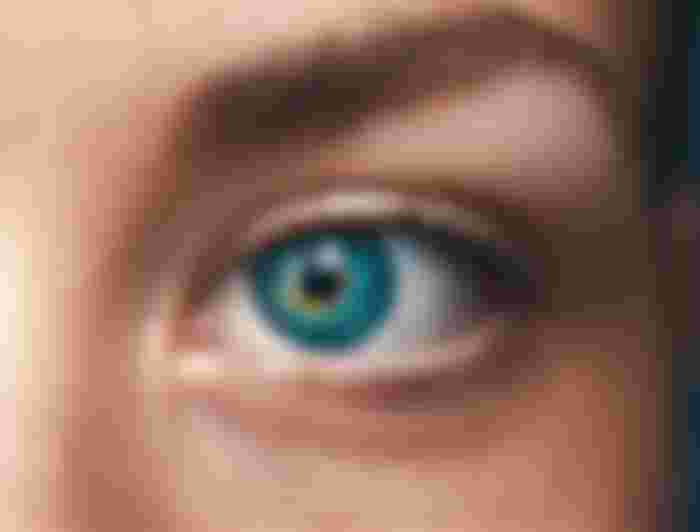
Facing sudden visual disturbances can make you feel insecure. A frequently observed phenomenon is eyes flickering. If it comes together with other symptoms, the uncertainty increases. What eye flickering means, what are the typical causes, when do you have to get treatment, and many other important questions on this topic, I will answer in this article.
Eye flickering vs. Visual snow
There is a huge difference between eye flickering and visual snow, or visual static. Because of the names, these two visual disorders are often mistaken. Visual snow is a neurological condition. Affected individuals often see little black or white dots. It can be limited to a certain region or it can affect the entire field of vision. This visual disorder can occur even with your eyes closed. You have a similar perception if, for example, you look into a light source or in the direction of the sun for a short time. Then you can often see the shape of this light source or some highlighted points in your visual sight. This light source has overstimulated the optic nerves and you will see the shape of the light source even with your eyes closed. Usually, the effect wears off again after a maximum of 30 minutes. However, if it lasts longer than 30 to 60 minutes or occurs more frequently, this can be an indication of a serious illness.
Eye flickering, eye twitching, or in a medical term called Blepharospasm on the other hand doesn’t affect your vision necessarily. It makes the muscles of the eyelid tremble uncontrollably. Most often it only affects one eyelid or just the upper part of it.
What are the possible causes of eye flickering?
There can be many causes for eye flicker. Doctors and scientists assume that a temporary circulatory disorder is responsible for this phenomenon. In most cases, the reasons for eye twitching are harmless. The decisive clue is not necessarily the intensity of the eye twitch, but rather the frequency and possible accompanying symptoms. The following factors are possible causes of eye flicker:
Stress, overwork. Especially if you spend too much time in front of electronic devices.
Lack of sleep or a poor sleep hygiene
Malnutrition: A lack of vitamin A, in particular, can cause various visual disturbances, including flickering eyes.
For a person with diabetes, flickering eyes can be a sign of fluctuations in blood sugar levels
Often, eye flicking and blurred vision in the distance occur in people who have developed myopia. So, it can also be a sign, that you need to wear glasses or you don’t have the right glass.
It can be a symptom of various diseases of the eyes, heart, and blood vessels
Migraines or eye migraines
Some medications and drugs can also have this effect
What are typical symptoms of eye flicker?
The eye flicker occurs only in very rare cases. Most often it is accompanied by the following symptoms:
Headache
Nausea
Dizziness
Sensitivity to light
Those affected feel very exhausted during or immediately after it and complain of fatigue
Pain and tension in the neck, back, arms or legs are also possible
When do we talk of ocular migraine?
If the eye flicker occurs more frequently, this could be a sign of an ocular migraine. In most cases, the visual disturbances only last five to ten minutes. In very rare cases, the symptoms can last for half an hour or more. Often the ocular migraine set in suddenly. It can be accompanied by symptoms such as dizziness and headache, but these are not always necessary. The visual disturbances always affect both eyes.
What other diseases can these visual disturbances indicate?
As already mentioned, the fibrillation of the eyes is in itself unpleasant for those affected, but it is not a severe illness. However, if it occurs more frequently or is accompanied by other symptoms, it can be a sign of various diseases, such as:
Eye disorders: inflammation of the choroid, retina, vitreous humor, or the optic nerves. It can also indicate glaucoma, also known as glaucoma.
Heart and vascular diseases: Permanently high blood pressure, arteriosclerosis, heart failure, inflammation of the heart, heart valves, and heart muscles
Migraines
Apoplexy
What treatment options are there?
Since there are different causes of fibrillation, the measures for treating the complaints also differ, of course.
In the event of a nutritional deficiency, for example, it can make sense to adjust the diet or, in acute cases, to take nutritional supplements.
There is no specific treatment for ocular migraines. Those affected have to find out which factors trigger the symptoms and try to avoid them as much as possible.
If it is inflammation of the eye, the doctor must first determine what is causing it and can prescribe appropriate medication such as antibiotics or antimycotics.
If the reason is high blood pressure, antihypertensive medication can help.
If glaucoma is responsible for the symptoms, treatment can be more extensive. First of all, eye drops and medication can help reduce the increased pressure in the eye.
In the case of serious illnesses or severe damage to the eye, such as an impending retinal detachment or acute cases of glaucoma, laser surgery can be useful.
How do you prevent eye flicker?
If the flickering of the eyes is stress-related, a change in everyday life and slowing down can already help to get rid of the symptoms. If you work at the computer screen for a long time, you should plan a break of 15 minutes after about a maximum of two hours of work. During this time, you ideally leave your desk to completely detach yourself from the screen. Relaxation exercises can also be helpful. In addition, many underestimate the importance of sleep in this context. A steady sleep rhythm is not only important for the regeneration of the brain, but also of the eyes. These measures will also help you against other diseases that can cause eye flickers.

I actually had that, maybe because of stress, lack of sleep and alwats facing the phone. Thats why i always feel dizzy everyday.